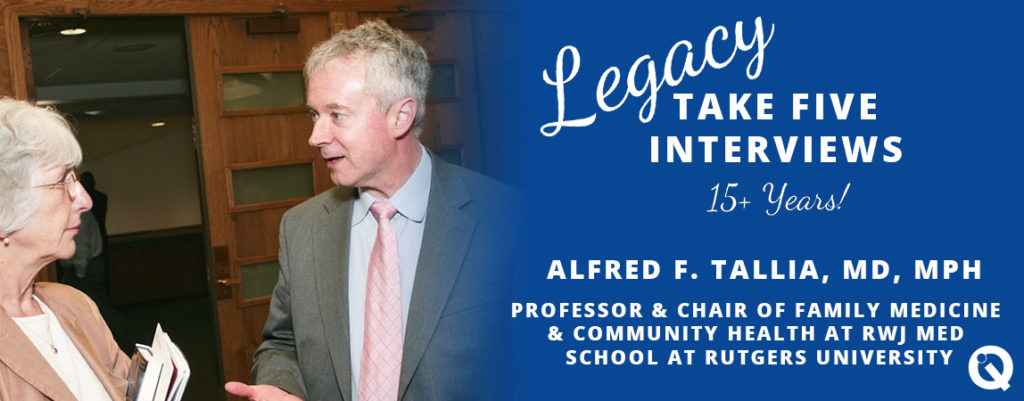Alfred Tallia with Quality Institute Board Member.
Alfred F. Tallia, MD, MPH, Professor and Chair of Family Medicine and Community Health at the Robert Wood Johnson Medical School at Rutgers University.
You recently were named Chair of the National Board of Medical Examiners. What critical differences do you see between your medical school education and the medical school education of today?
Over the course of the last 40 years — from the time I was a medial student to where we are today — I’ve seen an enormous shift away from what I call ‘paternalism.’ The doctor was considered the arbiter of what’s right or wrong. Now we see that the patient is the driver of their health care needs and the role not just of the physician, but of all health care providers, is to get the patient to the best place he or she can possibly be with respect to their health. It’s been a cultural shift.
You have been part of the Quality Institute for two decades through your leadership at Rutgers Robert Wood Johnson Medical School. What do you value most about your membership?
My life and my work is all about improving the quality of care that we as clinicians provide to our patients. As you might imagine, I found from the very beginning of working with Quality Institute — I was there at its inception — that my work was congruent with the objectives of the Quality Institute. I can say that everything the Quality Institute does and stands for fits tightly with everything I’ve tried to do as an academic physician.
Primary care and family medicine is essential to almost all of the new alternative payment models and innovations. How are you preparing your students for these changes?
I can tell you that we’ve been preparing and waiting for these innovations for 50 years! Every other Westernized, industrialized country — except for the United States — has recognized that primary care, family medicine specifically, along with public health, is an essential ingredient to having a healthy population…My work at Rutgers Robert Wood Johnson Medical School is connected to my work on the national level. I was involved in the Patient-Centered Primary Care Collaborative in Washington that had significant influence in framing the Affordable Care Act. At Rutgers, we have participated with just about every CMS and CMS Innovation Center experiment around different modalities that promote primary care and promote patients involvement in their own care. This works synergistically with what the Quality Institute is doing to improve care for individuals and families, particularly those in lower socio-economic populations.
You talk to many medical students unsure of their path in medicine. What changes in health care do you want to see that would encourage more young doctors and medical students to pursue a career in primary care?
The evidence boils down to economics. All the data we have from around the world demonstrates the more primary care you have the better the health of the population — and it costs a lot less. The reality is we have just about opposite the work force of other OECD (Organization for Economic Cooperation and Development) nations. Those countries have about 70 percent of their health care work force in primary care and about 30 percent in sub-specialty care. The United States actually has just the opposite. We have about 30 percent workforce in primary care and that means physicians, physician assistants, nurse practitioners.
Why is that? It’s the way the reward system is set up. The reward system in the United States has been pretty much promulgated by MedPAC, a committee mostly dominated by sub-specialists, that recommends to Medicare how to reimburse for things. Medicare has followed their lead. As a result, procedural and acute services are reimbursed at a far higher rate than cognitive and chronic/preventive services — disadvantaging family physicians, who mostly work in the cognitive domain. Medical students are smart people, and a lot of them go into debt to finance their education. So the more we can promote equity in the reward systems, the more likely we will get the workforce we need.
You have seen many innovations in health care. Looking ahead, what innovations do you believe will make the most difference to patients and their families?
Transparency in health care, specifically the reporting of performance of different parts of the health care system, will empower patients to make decisions that will benefit them. Not just on cost. That’s important. But reporting of quality data on hospitals and clinicians really is something that is empowering to people and will drive change for the better.

